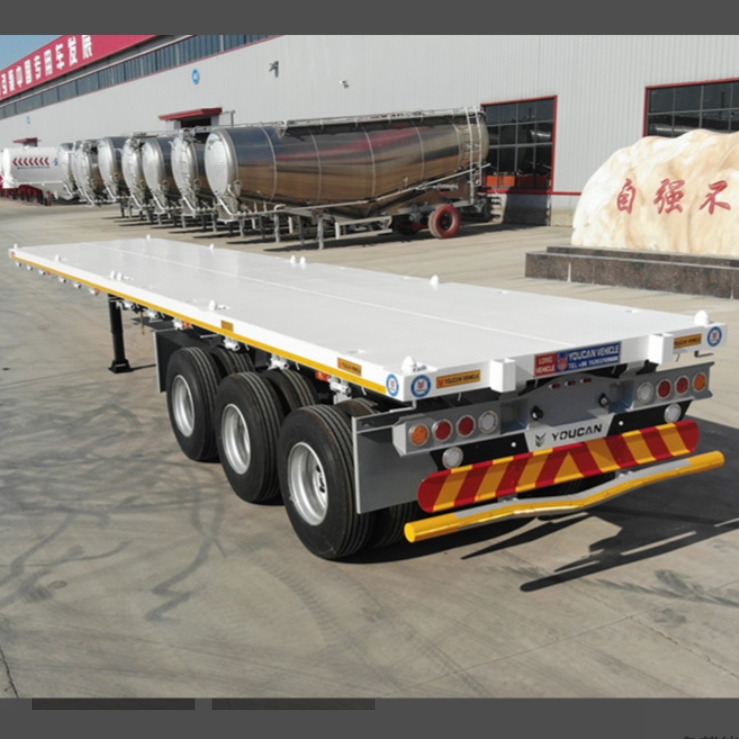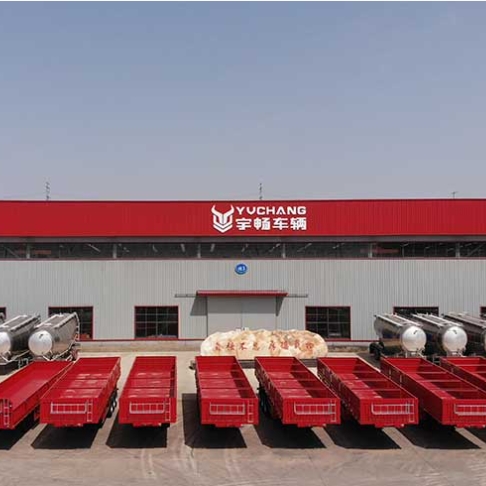Low bed trailer custom solutions
What is a low bed trailer?
A low bed trailer, also known as a lowboy or low loader trailer, is a specialized heavy-duty vehicle designed to transport large, heavy, wide, and tall cargo. These trailers are widely used across various industries, including heavy vehicles, rail vehicles, mining machinery, forestry machinery, agricultural machinery, and construction equipment. These trailers can be customized according to specific requirements.
Low bed trailers efficiently transport a diverse range of heavy loads, including finished products from different industries. Typically, cargo from these industries is packed in containers and stacked onto low bed trailers for secure and stable transportation. Due to their low center of gravity, low bed trailers allow for the movement of heavy cargo stacks without the risk of tipping over, making them invaluable for transporting substantial goods safely.As such, low bed trailers have become the go-to choice for the transportation of heavy, bulky, or oversized goods across diverse sectors. Their unique structural design and sturdy construction offer both reliability and adaptability, ensuring the safe and efficient transportation of a wide variety of heavy cargo.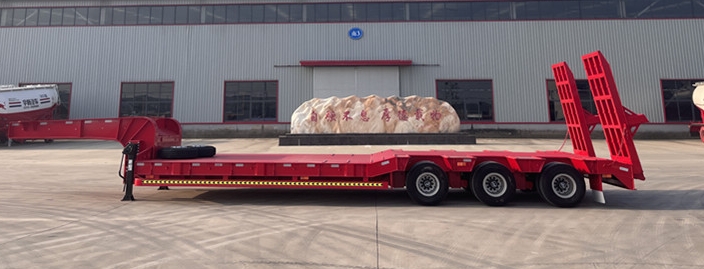
3 Axle Lowbed Semi Trailer For Sale
Application of low bed trailer
Low bed trailers play a crucial role in the transportation of heavy and oversized objects across various industries. Their unique design makes them suitable for carrying items that cannot be transported by standard semi-trailers. Here are some common applications of low bed trailers:
Construction Machinery Transport: Low bed trailers are frequently used to carry excavators and other construction equipment. They are particularly useful in the construction of roads and bridges. These trailers can transport large and heavy items such as concrete blocks, cement, and beams to construction sites, which might otherwise not be possible with ordinary semi-trailers.
Agricultural Machinery Transport: Low bed trailers are used to transport various agricultural equipment, including loaders, excavators, bulldozers, cranes, and pavers. These trailers can navigate muddy agricultural terrains and transfer machinery from one farm to another, making them indispensable for agricultural operations.
Mining Machinery Transport: The mining industry relies on heavy machinery for drilling and transporting materials like crude oil and minerals. Low bed trailers are instrumental in transporting off-site assembled mining equipment to mining sites. The robust structure of heavy-duty low bed trailers makes them ideal for accommodating the weight and size of mining machinery.
Heavy Vehicles Transport: Vehicle manufacturers depend on low bed trailers to move heavy vehicles like buses, tractors, and specialized vehicles between showrooms, ports, or directly to customers. These trailers allow for the simultaneous transportation of multiple small vehicles, providing a cost-effective and efficient solution.
Rail Vehicles Transport: Various rail vehicles such as road rail vehicles, trucks, locomotives, and trams are transported using low bed trailers. The common characteristic of these vehicles is their bulkiness, and low bed trailers provide an ideal means for their transportation due to their unique design and capacity.
By offering a versatile and efficient means of transporting heavy and oversized cargo across multiple sectors, low bed trailers have become an indispensable transportation solution in industries such as construction, agriculture, mining, automotive, and rail transportation.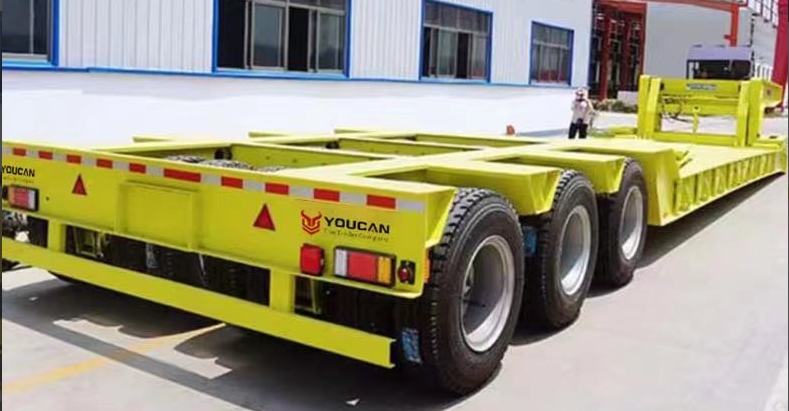
3 Axles Youcan Removable Gooseneck Trailer
Low bed trailer custom solutions
Low bed trailer custom solutions refer to the process of designing, manufacturing, and implementing tailored low bed trailers to meet specific transportation needs and requirements. Custom solutions can provide unique advantages for transporting heavy, oversized, or otherwise challenging cargo. As a reliable Lowbed Trailer manufacturer, YOUCAN Trailer provides you with the following advice when looking to customize your low bed trailer:
Identify requirements: Start by assessing your specific cargo transportation needs, such as the type of cargo, its dimensions, weight, and any unique loading and unloading requirements. This assessment will help you determine essential features and specifications for your custom low bed trailer.
Consult with experts: Collaborate with experienced trailer engineers and manufacturers to discuss your requirements and develop a plan for a custom low bed trailer design. These experts can offer valuable insights and guidance on the best approach to address your transportation needs.
Custom design and configuration: Work with the manufacturer to develop a custom design, including selecting the appropriate deck height, number of axles, type of suspension, and any specific features such as removable goosenecks, extendable trailers, or hydraulic ramps.
Material selection: Choose suitable materials for the construction of your custom low bed trailer, considering factors like durability, weight, and environmental impact. High-quality materials such as steel or aluminum alloys can provide a strong and long-lasting trailer.
Quality assurance and testing: Ensure that your custom low bed trailer adheres to industry standards and legal requirements. Verify the quality of the trailer through rigorous inspections and testing, covering aspects such as structural integrity, weight capacity, and overall performance.
After-sales support and maintenance: Partner with manufacturers who provide reliable after-sales support and maintenance services that cater specifically to your custom solution. This will ensure that you receive the necessary assistance for any repairs, parts replacement, or warranty claims.
Evaluate cost-effectiveness: While custom solutions can provide the ideal fit for your unique requirements, remember to consider the associated costs. Weigh the benefits of customization against the overall investment, including design, manufacturing, and maintenance expenses.
By following these steps, you can develop a custom low bed trailer solution tailored perfectly to your specific transportation needs, ensuring efficient, safe, and compliant cargo hauling.By following the steps above, you can develop a custom low bed trailer solution that is perfectly suited to your specific transportation needs, ensuring efficient, safe, and compliant cargo transportation. YOUCAN Trailer can provide you with the best solution regarding Low bed trailer.
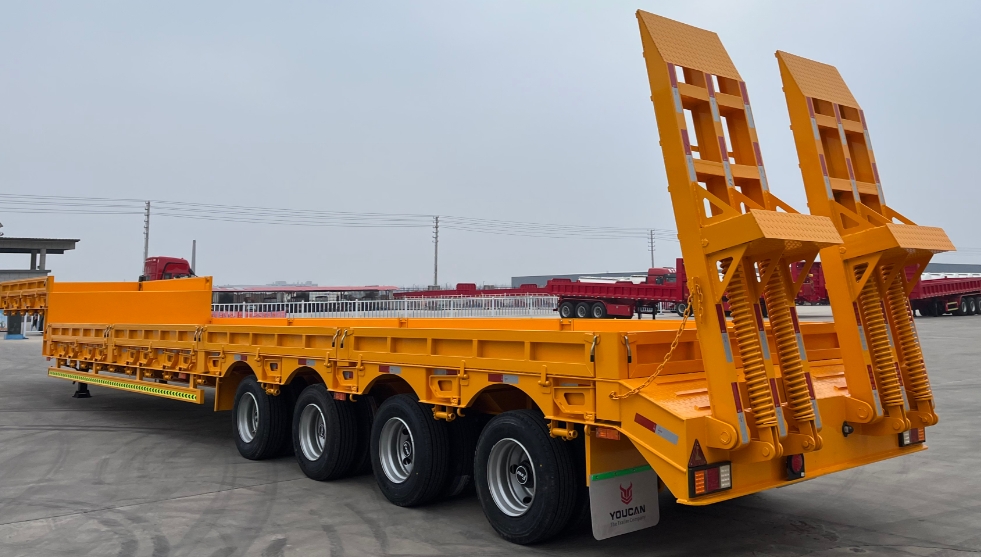
120Tons 4 Axles Youcan lowbed Semi-Trailer for Commercial Truck
Key Components of a Low Bed Trailer and Their Functions
A low bed trailer is a specialized type of trailer designed for transporting heavy and oversized cargo. Its low deck height allows for taller loads while adhering to road height restrictions. In this article, we will describe the key components that make up a low bed trailer and their respective functions:
1. Chassis
The chassis serves as the primary structural framework of the low bed trailer, supporting the cargo bed and all other components. It is typically made of high-grade steel for durability and strength.
2. Gooseneck
The gooseneck connects the trailer to the towing vehicle and serves as the attachment point. It can either be fixed or detachable, allowing the front part of the trailer to be lowered for easy loading and unloading of heavy equipment.
3. Axles, Suspension, Wheels, and Tires
Low bed trailers rely on multiple axles, an appropriate suspension system, and suitable wheels and tires to support the weight of the cargo, provide a stable ride, and evenly distribute the load. The number of axles can vary, depending on the trailer's load capacity and legal limitations. Selecting the correct tire types and performing regular maintenance on the wheels and tires is crucial for the trailer's performance and longevity.
4. Braking System
Low bed trailers are typically equipped with an air-brake system that operates in conjunction with the towing vehicle's brakes. This system ensures safe, reliable, and responsive braking, preventing accidents while transporting heavy cargo.
5. Loading Ramps
Low bed trailers often feature hydraulic or manual loading ramps at the rear, enabling easy loading and unloading of heavy equipment and vehicles. Various ramp styles are available, including spring ladders, hydraulic ramps, and folding hydraulic ladders.
6. Deck
The deck or bed is the flat surface on which the cargo is placed for transportation. Low bed trailers often feature a lower deck height, enabling them to carry taller cargo while complying with road height restrictions.
7. Lashing Points
Lashing points are strategically placed attachment points on the trailer for securing the cargo using chains, straps, or ropes. Properly securing the cargo at these lashing points maintains stability and safety during transportation.
8. Lighting and Electrical System
Low bed trailers are outfitted with lighting and electrical systems, which enhance visibility and safety during transportation. These systems include tail lights, brake lights, turn signals, marker lights, and connections to the towing vehicle's electrical system.
By understanding these key components and their respective roles, you can properly maintain and operate a low bed trailer, ensuring safe and efficient transportation of heavy and oversized cargo.
Factors affecting the price of low bed trailers for sale
The price of low bed trailers can be influenced by various factors, which may impact the overall cost of purchasing or renting one. Some key factors affecting the price of low bed trailers include:
Dimensions: The size of the low bed trailer, including its length, width, and height, can significantly influence its price. Larger trailers typically require more materials and labor for manufacturing, making them more expensive.
Load capacity: Higher payload capacity and axle configurations usually result in higher costs, as they require a more robust design, additional supporting components, and high-quality materials to ensure safe transportation of heavier cargo.
Materials: The quality and type of materials used in constructing the low bed trailer, such as steel or aluminum, also affect the price. High-quality or specialized materials can increase the cost of the trailer due to the improved strength, durability, or lightweight properties.
Design features: Additional features, such as hydraulic ramps, detachable goosenecks, and self-steering axles, can further increase the price of the low bed trailer by offering enhanced functionality, versatility, or ease of use.
Manufacturing brand: The reputation, experience, and perceived quality of the manufacturer can also impact the price. Trailers from well-established, reputable brands may command higher prices, reflecting their quality, customer service, and after-sales support.
Market demand: Market conditions and fluctuations in demand for low bed trailers can influence pricing. Increased demand can drive up prices, while a surplus or competitive market environment may result in lower prices.
Customization: Any specific customizations or adjustments made to the trailer to meet unique transportation requirements or preferences can add to the overall cost, depending on the complexity and extent of modifications.
Geographic location: Prices can also vary depending on the country or region where the low bed trailer is being purchased, reflecting local labor costs, taxes, import/export duties, and other economic factors.
When purchasing or renting a low bed trailer, it's essential to consider these factors and weigh the long-term benefits against the costs, ensuring that you select a high-quality, durable trailer that meets your transportation needs while adhering to your budget.As a senior low bed trailer manufacturer, Youcan Trailer has advanced production technology and complete production equipment; it has stable raw material supply channels; we can provide you with a lower quotation while ensuring quality, so that your low bed The trailer purchase was successfully completed. Please contact us today to get more information about custom low bed trailers.
Conclusion
In conclusion, the article demonstrates the importance of custom solutions for low bed trailers in meeting the unique needs and challenges of various industries. Customization enables the tailored design, production, and optimization of low bed trailers to accommodate specific loads, dimensions, and transportation requirements. By collaborating closely with experienced trailer manufacturers such as Youcan Trailer, businesses can access reliable and efficient tailor-made solutions that cater to their distinct shipping needs, ensuring the safe, secure, and compliant transport of their goods and equipment.

 WhatsApp
WhatsApp
 sales@youcantrailer.com
sales@youcantrailer.com
 +8615203709888
+8615203709888
